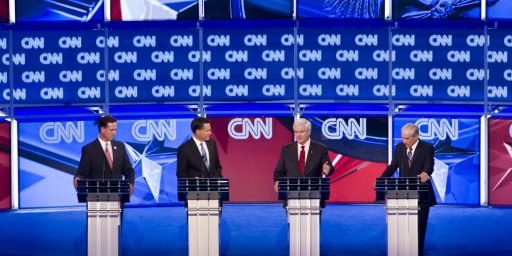Republicans Losing the Senate?
Qorvis Communications managing director Bill Cullo thinks the numbers right now are very bad for Republicans in their bid to hold onto the Senate. He notes that the Democrats need to increase their number of seats by 5 to achieve a 50-50 tie (although that would be just as good as a win for the GOP, with VP Cheney breaking the tie) and 6 to regain control.
He points to several key races where the Republican incumbent is polling under 50% less than 90 days out from the election: Burns in Montana,Talent in Missouri, DeWine in Ohio, Santorum in Pennsylvania, and Chafee in Rhode Island. The Burns and Chafee races are statistical dead heats but the incumbents are at 42% and 37%, respectively. Meanwhile, the Democrats appear likely to hold on to the open Dayton seat. Ditto Republicans and the open Frist seat.
These numbers don’t look good for the GOP. On the other hand, if they keep only one of those seats, they’d retain control of the Senate. That appears likely in my view, with Burns in a tie after having trailed 7 points a month ago. Even Santorum is closing the gap, although I doubt he’ll win.
A side note: Cullo is posting on the Crosstabs blog, a new venture sponsored by RedState. They’ve brought together a group of six professional Republican pollsters to analyze survey research and explain it to a public audience. Among them is Rob Autry, a friend and a colleague of my wife’s at Public Opinion Strategies. It should be an interesting contribution to the blog landscape.
Update (Steve Verdon): Just thought I’d point out this isn’t really good news for the Democrats. Suppose that the probability of Republicans holding onto each one of the six seats in question is 0.4 (or 40%). To win control the Democrats have to win all six seats, or conversely the Republicans have to loose all 6. Using Excel’s handy-dandy binomial distribution function the probability of this happening is about 4.67%. Even if we lower the probability of a Republican win in each of these elections to 10% the chances of the Democrats retaking control is still only 53%.





A little lesson in combinatorics might be in order. What’s the likelihood of event A AND event B AND event C, etc.?
As I’ve thought for some time I think there’s a possibility that Democrats will retake the House and Senate. Even now I don’t think it’s a likelihood: too many races would have to break just their way. Larry Sabato’s most recent take, basically, supports that view. There seem to be quite a few (at least in the blogosphere) who think it’s a dead cert.
If the Democrats retake neither the House nor the Senate what will the political climate be like?
Myself, I don’t see the Dems retaking either house. At best (from my Dem p.o.v.), filibusters in the Senate will get easier, and the Dems will be a little emboldened.
But the framing of 2006 as “retaking Congress!” of course will make even an impressive Dem victory at the polls into a failure, “because they didn’t retake Congress.”
Dave,
I think the left might want to take a lesson in expectation management. Lamont was seen as a double digit leader in the primary, so a sub-4% win is a win, but loses a little luster. The more the expectation is that the democrats will take both chambers, the more the republicans retaining control of either or both chambers will be seen as a GOP victory.
Right now, the GOP is at a 75 year high in the house and senate in terms of seats held. Unless you are stuck in a late 90s view of the stock market as only going up, there will undoubtedly be reductions from that high going forward. Just as the GOP lost the senate six times and won it six times in the last 75 years, the current majority is not going to last forever. In the house the chamber has only seen the republicans lose three times and win three times in the last 75 years.
If you take Daly’s political maxim to watch the races where the incumbent is consistently polling below 40% (because the undecideds have had years to get to know the incumbent and if they aren’t for them now they aren’t likely to break for the incumbent on election day) you see an interesting race dynamic.
Republican seats with the incumbent averaging below 40%
Talent
Burns
DeWine
Santorum
Chaffee
Democratic seats with the incumbent averaging below 40%
Lieberman (special case I agree)
Stabenow
Menendez
Cantwell
Open seats with both candidates averaging under 50%
Maryland (open D seat)
Minnesota (open D seat)
Tennessee (open R seat)
So while there are five republican seats with incumbents in trouble because they are polling below 50%, there are also three democratic seats where the incumbent can’t poll consistently above 50% (plus CT which is likely to be won by a democrat in any case).
The open seats look to be held by their respective parties, but none have candidates that have closed the deal.
I find myself agreeing with the analysis from both of the commenters who followed me completely.
Steve: thanks for the update. My quick mental calculation suggested it was low but not quite that low. Don’t they teach combinatorials in prob/stat any more?
Dave,
Beats me, they did back when I did…about 18 years ago.
You never can tell. Since I took the Probability and Statistics sequence more than 30 years ago a lot has changed in higher education.
Doesn’t your calculation require that each election is an indepepndent event? If there are national issues that means that each election is not an independent event your propabilities do not hold.
Spencer,
I forget if it was Chicago machine boss Daley or Tip O’Neil, but all elections are local. Even if you crank the odds up to 90% for every election where one side or the other isn’t consistently polling above 50% to go in the democratic favor (5 republican incumbents, 3 democratic incumbents and 3 open seats), you still only get a 31% chance of success. And you really have to be drinking the koolaid to think each of those races has a 90% chance of the democrat winning.
If they must lose control of the Senate -do we get to decide who gets fired? I have a long list and every last name on it begins with RINO!